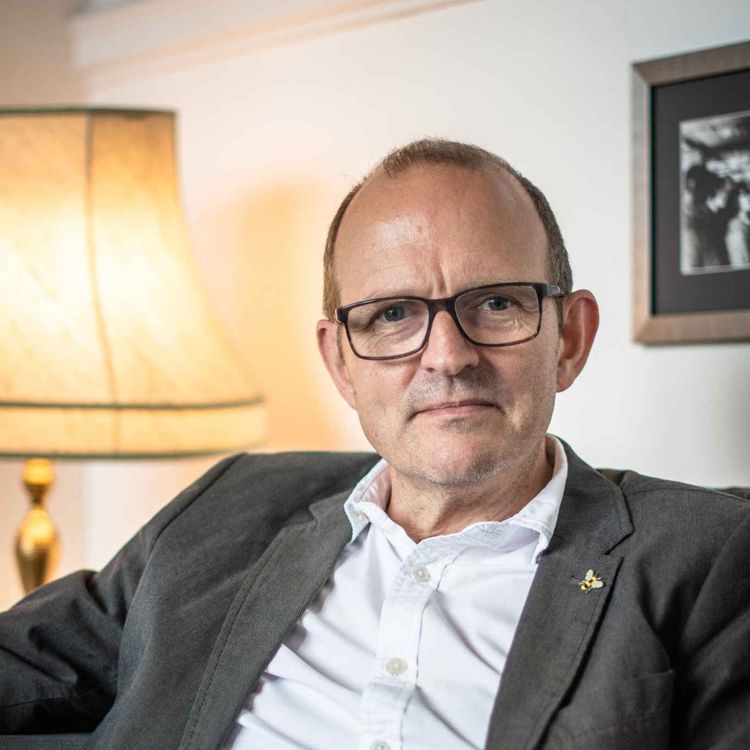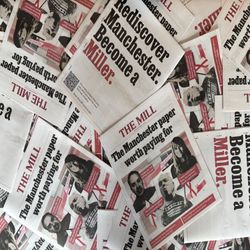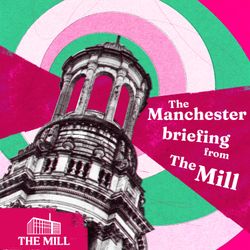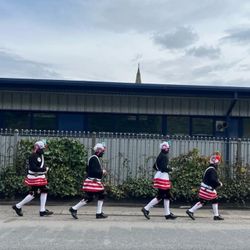Share

The Manchester Briefing from The Mill
'Cheap talk'? A former Downing Street advisor takes on critics of the 'Manchester model'
Some say the 'Manchester model' is a cautionary tale about what happens when a city hands over its keys to property investors. Others say it's an example of how the great cities of the UK should regenerate and rebuild their prosperity. Economist Mike Emmerich is closer to the second view and has been a key voice in the city for decades. He used to be an advisor in the Treasury and Downing Street before returning home to Manchester, where he helped to negotiate the first big devolution deal. In an in-depth interview with Joshi, he expresses frustration with "the cheap talk of a certain kind of radical politics that fails to give credit to the city's leaders for the unbelievable hard work that they did to bring this city back from the near dead".
In the episode, we refer to Mike's recent lecture at the University of Manchester and Daniel's long read for The Mill about whether the city's economic growth is benefiting Mancunians more broadly.
Thanks to our sponsors Glow, at the RHS Garden Bridgewater for supporting this episode and our journalism. Book your tickets now.
More episodes
View all episodes

Our reporting leads to resignations at the University of Greater Manchester and Rochdale Council
26:01|In our first podcast episode of 2026 Joshi and Jack round up the first week back at Mill HQ. They discuss the two major resignations caused by our reporting into the University of Greater Manchester, Manchester City Council and Rochdale Council, and round up Ophira's reporting on a mysterious spate of graffiti targeting Manchester businesses. Thanks to our sponsor, Manchester Museum. If you want to find out more about the Africa Hub's work at the museum, click below:https://www.museum.manchester.ac.uk/galleries/africa-hub
How The Mill will make Manchester a better place - with your help
16:51|In today’s episode, Joshi and Jack sit down to talk about The Mill’s first ever membership campaign. Over the next few weeks, we want 1,000 new members to join The Mill, so we can commit to six pledges to make Manchester a better place. With that new support, we’ll go into schools to talk about misinformation, make subscriptions free for first time voters and open a mentorship program for aspiring young journalists in Greater Manchester. This is about The Mill’s becoming more than just a newspaper, and how you can be a part of it.
Terror comes to Manchester again: Horror and hope after the synagogue attack
22:23|When news broke about an attack on Jewish worshippers outside Heaton Park synagogue, The Mill's staff writers Jack Dulhanty and Ophira Gottleb were sent to the scene to report. In Ophira's case, she spent the best part of three days straight in the area, interviewing people and vising a community in shock and at prayer. She and Jack discuss what it was like to cover the atrocity, and why Ophira chose to write a much more personal - and hopeful piece - a few days later. If you enjoyed this episode, please share it with friends to spread the word, or become one of our members with a discount by clicking here. Note: this podcast was recorded on Tuesday 7 October and only published on Sunday 12 October because of an issue we had uploading.
Inside the fight to get into Trafford’s grammar schools
13:09|Backstabbing parents, extortionate private tutoring companies and a 'web of deceit'. This is the world of Trafford Grammar Schools, a highly selective group of schools where each year, desperate families put their children through extensive private tutoring to pass the rigorous 11+ exam. Are they living up to their original promise of delivering exceptional education to working-class children? And is there a sense of cruelty in how the system works? Ophira Gottlieb, staff writer at The Mill, takes you inside her reporting.Read Ophira's first story: Backstabbing, crying, and a ‘web of deceit’: Inside the fight to get into Trafford’s grammar schoolsRead her second story: Grexit: should Trafford keep its grammar schools?To read more of these stories and support our mission to bring about a renaissance in high quality journalism in the North, sign up as a paying member for just £4.95 for your first three months.With thanks to our sponsor, Newton Music Festival. If you fancy a summer weekend of DJs, bands and festival fun, Newton Music Festival is offering just that from Friday 1st to Sunday 3rd August. The lineup includes (former Mill contributor) Dave Haslam on Friday, The K’s on Saturday and Flash (a Queen tribute band) on Sunday, and is set to repeat the incredible success of last year’s festival. Hosted in the beautiful Mesnes Park, just a 20 minute train from Piccadilly, Newton Music Festival has something for everyone. Day tickets start at £15 and Mill readers can get an exclusive 10% discount using the code ‘1qjpad’ – click here to book.
5. Meet the Showmen of Bolton
10:40||Season 2, Ep. 5
4. The Salford Matador is still making a killing
14:07||Season 2, Ep. 4Ophira has a story for you — one about Frank Evans, the 81-year-old Salford-born matador who now splits his time between Seville and Worsley like it’s the most natural thing in the world. Yes, that’s right: matador. While the city proudly boasts of luring the BBC up north, appearing behind the Smiths in That Photo, and producing Paul Scholes’ right foot — somehow, Frank slips through the net. But this is a man who traded Eccles cakes for cape work, and against all odds became one of the only Brits to ever rise to bullfighting’s top tier.
3. Pyramid scheme
15:05||Season 2, Ep. 3Jack tells the story of his trip to the newly-built Royal Nawaab, the multi-story curry house which has been built in Stockport’s iconic glass pyramid on the Valley of the Kings. But while Mahmood Hussain, the curry maestro with a “strongman’s slab of tache resting on his top lip”, hopes his £15 million renovation will pay off, has he considered the ancient pharaoh's curse which has been said to hang over the valley…
2. The folk dancers who refuse to stop blacking up
10:39||Season 2, Ep. 2Our writer Ophira Gottlieb tells the story of the Britannia Coconut Dancers of Bacup, in Lancashire. For over a century the troupe of morris dancers has performed up and down the town’s streets dressed in knitted jumpers, candy-striped kilts, and painted completely black. “I worked in a pub just outside Manchester,” Ophira remembers, “many of the customers felt the practice was racist and badly outdated, but just as many disagreed.” On Easter weekend, Ophira finally met these dancers. Nicknamed the “Coconutters”, Ophira set out to understand why they hold a practice that many find so offensive so close to their hearts.
1. A new Manchester industry: pit stops for delivery riders
13:08||Season 2, Ep. 1In the first of our new series of audio storytelling, Jack tells the story of how the new bike repair shops that have sprung up to offer rapid repairs to Manchester’s legions of delivery riders. “Some Mill stories are the result of months of work and research and planning, and some are born out of necessity,” Jack says, “The story I’m about to tell you was the latter.” But while the story itself was written to replace another story that fell through, it became a reader-favourite, offering an insight into a hidden world.